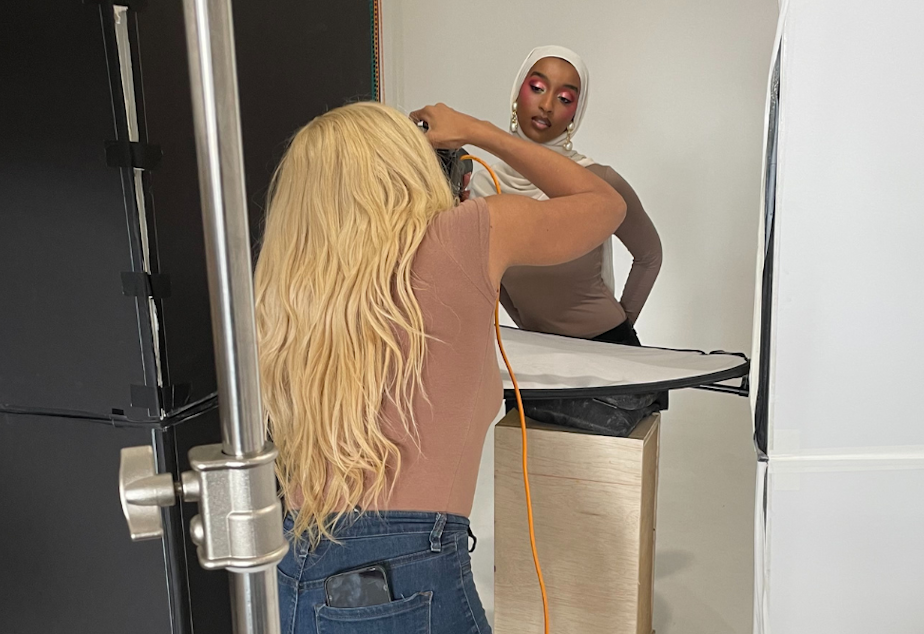What's it like being a hijab-wearing model?

Fatuma Yusuf faces and embraces the challenges of being a woman who wears the hijab in the modeling industry.
Her sister, RadioActive’s Maymuna Yusuf, has her story.
[RadioActive Youth Media is KUOW’s radio journalism and audio storytelling program for young people. This story was entirely youth-produced, from the writing to the audio editing.]
M
y sister is the person you could spot from a mile away, the one that stands out in a crowd. She’s this ray of sunshine who always has a smile on her face. She's extremely outgoing, friendly, and wise.
Ever since we were little kids, she loved being photographed. She loved the camera as much as it loved her. Growing up, playing fashion runway was one of our favorite games, and — no surprise — Fatuma was the best at it.
Sponsored
Fatuma went to college to study English and psychology, but it wasn't her calling. So, she began freelance modeling for our sister's clothing brand, Riyya Collection. They even ended up being featured in British Vogue.
"I'm not your average model," Fatuma said. "I'm a Black woman, I'm a Muslim, and I'm a woman that wears hijab."
Fatuma started taking on more modeling gigs, which eventually led her to get signed with Seattle Modeling Guild. She would try sneaking a few gigs in between classes and after work — even coming home at suspicious hours, according to our mom.
"I think mom started to catch on a little bit, because I would come home with like full-face makeup, and she's like, 'Girl, what are you doing,'" Fatuma said.
Sponsored
By this point, Fatuma knew modeling was more than just something she did on the side. When she got contracted to work with Wilimena in New York, she decided to come clean to our parents. But they weren't exactly over the moon about it.
"I just didn't have the confidence or the heart to tell them this is what I'm doing," she said. "When it came to me telling them, I remember dad being so upset."
Coming from a family of refugees — let alone Muslim ones — modeling isn't the career they envisioned for their child. They tried talking her out of it, but Fatuma had her mind made up.
When my sister moved to New York City to fully launch her career, she was booking photoshoots and advertisements while also working part time. Most things were working in her favor. But not everything.
"I kind of isolated myself when I first went to New York," she said. "It was just hard. But I can really thank some of my closest friends, like Nyssa and Ayan, for reminding me to call [my] parents, and let them know [I'm] okay."
Sponsored

But after Fatuma came home from New York for a visit, our parents grew accepting of her decision. Not fully accepting, but a lot more than before.
Everything was going well with Fatuma in New York City. She booked gigs with the biggest names in the industry — Bobbi Brown, Fenty Beauty, Uniqlo, Aldo. But the more gigs she booked, the more her relationship with her hijab started to change.
She said she felt the need to comprise her hijab at times as a model.
"Especially when I first started, I definitely did not wear my hijab 'properly,'" she said. "My hair would just be covered, my ears would be covered, I would like have maybe like a turtleneck."
Sponsored
It wasn't that she felt uncomfortable wearing those styles. Instead, it had to do with the fact that she felt like she wasn’t living up to the standards of a hijab-wearing model.
So after receiving an overwhelming amount of support from other Muslim girls, Fatuma decided it was time to take a step back and to hold herself accountable.
"When it comes to modeling, if this is something that I want to give justice to and do right, I think I should do it the right way," she said.
Now 27, Fatuma realizes that in order to find what you love, you need to take that chance, because it might not come again. And that's what Fatuma does: she takes chances and does things for her own sake, even if it means she doesn't get the support she had anticipated.
Fatuma needed that independence to truly grow into the person she is now. And even while she still sees room for improvement — whether it is with her hijab or anything else — I’m proud to call her my big sister.
Sponsored
This story was produced in a RadioActive Youth Media introductory workshop for high school-age youth. Production assistance by Antonio Nevarez. Edited by Brandi Fullwood. Prepared for the web by Kelsey Kupferer.
Find RadioActive on Instagram, TikTok, YouTube and Facebook, and on the "RadioActive" podcast.
Support for KUOW's RadioActive comes from the Bill & Melinda Gates Foundation Discovery Center and BECU.


